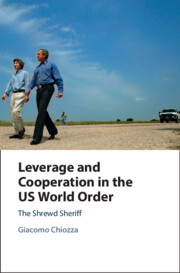
- Cited by 1
-
Cited byCrossref Citations
This Book has been cited by the following publications. This list is generated based on data provided by Crossref.
Chiozza, Giacomo and Khalifa, Lena 2024. The harsh face of the empire by invitation: Coups in the US world order. Conflict Management and Peace Science, Vol. 41, Issue. 2, p. 110.
- Publisher:
- Cambridge University Press
- Online publication date:
- July 2023
- Print publication year:
- 2023
- Online ISBN:
- 9781009355049


